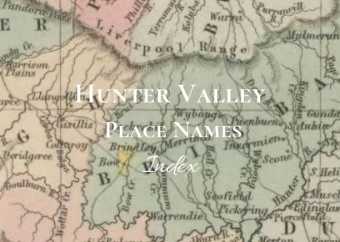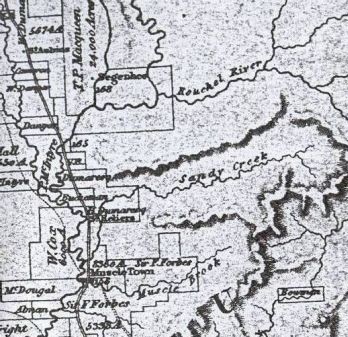Hugh Cameron - Settler
Map 8

Hugh Cameron arrived in Sydney via Hobart on the Australian Company's ship Triton in August 1827.
The Triton under Captain James Crear departed Leith 20th March and touched at St. Jago on the passage out. Passengers included Mr. and Mrs. Murdoch Campbell, Capt. and Mrs. Bell and three children; Mr. William Macqueen, Mr. John Malcolm, Mr. Hugh Cameron, Mr. Alexander Watson, Mr. William Laird, Mrs Irdale, Miss Ann Iredale, Miss Mary Iredale, Miss Chritiana Iredale, Miss Amelia Beck, Miss Maria Beck and Jane McKenzie.
Land Grant
Hugh Cameron is on the Return of Lands Granted in County Durham in 1828. He was granted 1280 acres of land by Governor Darling on 18 October 1828. In 1830 he was granted permission to depasture livestock on 400 acres of land adjoining his estate.
Bushrangers
A gang of bushrangers were found guilty of robbing Hugh Cameron's station at Kingdon Ponds in 1830. They were a desperate set of men and were known as the Hunter River Banditti. Previous to the robbery at Hugh Cameron's station they had robbed a hut on a grazing run belonging to Joseph Onus.Edward Bowen - arrived on the John in 1827
Charles Westbury - arrived on the Marquis of Hastings in 1828
Patrick Feeney - arrived on the Larkins in 1829
John Mason - arrived on the Norfolk in 1825
Hugh Duffy - arrived on the Mangles
Morgan Browne - arrived on the Speke in 1826
Patrick Donnelly - arrived on the Asia in 1824
John Donovan - arrived on the Hooghley
Hugh Cameron was a witness at their trial. He stated that knew John Mason and Hugh Duffy who had absconded from the service of Henry Dangar. -
Hugh Cameron's testimony -
I live at Kingdon Ponds, in the district of Hunter's River ; about half past 8 o'clock at night, on the 9th of August last my house was entered by four armed men, one of whom had a sword, another a pistol, and the third had a musket, but I do not know what arms the fourth man had ; I was putting off my clothes to go to bed at the time, when I heard the dogs bark loudly ; immediately after, the men rushed in and struck one of my servants a blow which knocked him down ; the man with the sword then came to me and pointed it to my breast ; the man who had the pistol also presented it at my breast ; I laid hold of the sword with one hand, and with the other threw off the pistol ; three men then rushed on me and threw me down ; I told them if they would let me up I would se what I would do ; they did suffer me to rise, and finding resistance useless, I submitted ; one of them then led me to a store-room, and bound me on a stool ; they then bound the servants to me, one on each side, with a rope, covered us over with a blanket, and then demanded my keys.
I told them I would not give them up, upon which they procured a hammer, and broke open several chests, out of which they carried off a quantity of blankets , sheets, and other articles; they stayed in the house from two to three hours ; all this time myself and servants remained under the blanket, but there being three of us under it, it was not sufficiently large to cover us altogether, and I had many opportunities of looking out and seeing the robbers by the light of the fire ; they took away property worth, £100, consisting of a silver watch, a pair of pistols, silver-mounted, a silver-hilted sword, all my wearing apparel, blankets, sheets, a saddle bridle, and a number of other articles ; four men only entered my house ; three of them robbed the house, while the fourth stood over me with a musket presented at me; I would know "three of the men again ; the prisoners, Mason, Duffey, and Browne, are they ; I cannot say that I ever saw any of the men before the robbery ; Mason and Duffey I heard were assigned servants to my neighbour, Mr. Dangar, but I can't remember having noticed them before ; one man was afterwards shot with some of my clothes on.
I recovered about three-fourths of the property I lost ; I speak positively to the men I have pointed out; the prisoner. Duffey, surrendered himself, I heard ; I have never seen Browne from the night of the robbery till now, hut I have no doubt in my own mind that he was one of them [3]
The bushrangers were apprehended by Sergeant Thomas Quigley of the mounted police. They had with them a few farming implements, seed and provisions and hoped to go far into the bush to settle. Mason and Duffy along with Edward Bowen and Patrick Finney were found guilty of robbing Hugh Cameron and were sentenced to death. They were executed on Saturday 15 January 1831.
On the scaffold, Duffey confessed to a crime he had committed in Ireland, before being transported, and for which another man had been found guilty. -
Before I left Ireland, I committed a robbery in the county of Cavan, for which another person was taken up, convicted, and sentenced to transportation, He is now in this country, his name is (owing to the sudden movement of the crowd at this moment, our reporter was unable to hear the name). He is a shoemaker by trade, and now, I believe, resides in the district of Bathurst. He is entirely innocent of the offence for which he suffers, it having been committed by me alone. I beg pardon of God and society for all the crimes I have committed. May the Lord have mercy on my precious soul! and I beg all you good people to pray for me. Oh! I entreat you to take warning by my fate, for believe me, if I could begin my life anew, I would lead a very different one.
Three of the men, Duffy, Mason and Bowen died instantly however Patrick Finney (Feeney) suffered greatly. The rope by some means became entangled with his arm, and he was suspended thereby till the hang man went up the steps and disengaged, it; the fall having been broken the neck was, not dislocated, and he remained for a considerable period of time, suffering all the horrors of protracted strangulation.
How Scone got its Name
The town of Scone, parish of Strathearn owes its name to Hugh Cameron after he received a favourable hearing in the ears of fellow Scotsman Surveyor-General Sir Thomas Mitchell in December 1831......The party moved off at seven, and passing, soon after, near the farm of an old man whom I had assisted some years before in the selection of his land, I rode to see him, accompanied by Mr White. He was busy with his harvest, but left the top of his wheat-stack on seeing me, and came running up, cordially welcoming us to his dwelling. A real Scotch bonnet covered the brow of a face which reminded me, by its characteristic carving, of 'the land of the mountain and the flood.' The analogy between the respective features was, at least, so strong in my mind, and the sight of the one was so associated with the idea of the other, that had I seen this face on a stranger, in a still more distant corner of the earth, it must have called to mind the hills of my native land. The old man was very deaf; but in spite of age and deafness, his sharp blue eye seemed to express the enduring vigour of his mind. He had buried his wife in Scotland, and had left there a numerous family, that he might become its pioneer at the antipodes. He had thus far worked his way successfully, and was beginning to reap the fruits of his adventurous industry. Sleek cattle filled his stock-yard, his fields waved with the yellow grain, and I had the satisfaction of learning from him that he had written for his family, and that he soon expected their arrival in the colony. He immediately gave grain to our horses, and placed before us new milk, and, what we found a still greater luxury, pure water from the running burnie close by; also, a bottle of ' the mountain dew,' which, he said, was from a still which was 'no far off-' When I was about to mount my horse, he enquired if I could spare five minutes more, when he put into my hands the copy of a long memorial addressed to the Government, which he took from among the leaves of a very old folio volume of Pitscottie's History of Scotland. This memorial prayed, that whereas Scoone was in the valley of Strathearne, and that the pillow of Jacob, which had been kept there as the coronation-stone of the Kings of Scotland, was fated still to be where their dominion extended; and as this valley of the Kingdon Ponds had not as yet received a general name, that it might be called Strathearne, etc. Ac. We were finally compelled, although it still wanted two hours of noon, to drink a 'stirrup cup' at the door, when he most heartily drank success to our expedition, and I went on my way, rejoicing that, on leaving the last man of the white race we were likely to see for some time, the ceremony of shaking hands was a vibration of sincere kindness.' -
Blackwood's Edinburgh Magazine
In 1839 Hugh Cameron and his wife Janet conveyed the land to William Black.[1]
Subsequently Hugh Cameron obtained an interest in the farm which he assigned to his son John. John Cameron and William Black sold the land to William Dangar and Dangar later claimed Deed of grant. [2]
Notes and Links
Hunter Valley Bushrangers IndexReferences
[1] Sydney Gazette 2 July 1839[2] Government Gazette 3 July 1839
[3] Sydney Gazette 11 January 1831
↑
